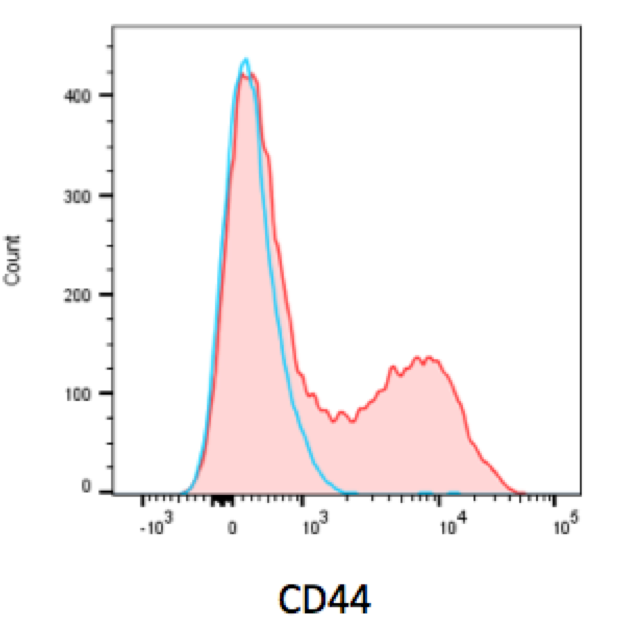Canine CD44 APC-conjugated Antibody Summary
Accession # Q28284
Applications
Please Note: Optimal dilutions should be determined by each laboratory for each application. General Protocols are available in the Technical Information section on our website.
Scientific Data
 View Larger
View Larger
Detection of CD44 in Canine Blood-Derived Lymphocytes by Flow Cytometry. Canine blood-derived lymphocytes were stained with Mouse Anti-Canine CD44 APC-conjugated Monoclonal Antibody (Catalog # FAB5449A, filled histogram) or isotype control antibody (Catalog # IC002A, open histogram). View our protocol for Staining Membrane-associated Proteins.
Reconstitution Calculator
Preparation and Storage
Background: CD44
Canine CD44 (also known as HCAM and Hermes) is a ubiquitously expressed 85‑90 kDa type I transmembrane glycoprotein that binds to hyaluronan, laminin, fibronectin, selectins, osteopontin, and chondroitin sulfate, and is involved in matrix adhesion, lymphocyte activation, and lymph node homing. The CD44 protein is expressed as a family of molecular isoforms that, in human and presumably in canine, are generated by alternative splicing and variable posttranslational modification. It is reported to form a complex with CD147. Within the N‑terminal invariant portion of the ECD (aa 14‑191), canine CD44 shares 90%, 83%, and 82% identity with human, mouse, and rat CD44, respectively.
Product Datasheets
FAQs
No product specific FAQs exist for this product, however you may
View all Antibody FAQsReviews for Canine CD44 APC-conjugated Antibody
Average Rating: 5 (Based on 1 Review)
Have you used Canine CD44 APC-conjugated Antibody?
Submit a review and receive an Amazon gift card.
$25/€18/£15/$25CAN/¥75 Yuan/¥2500 Yen for a review with an image
$10/€7/£6/$10 CAD/¥70 Yuan/¥1110 Yen for a review without an image
Filter by:








